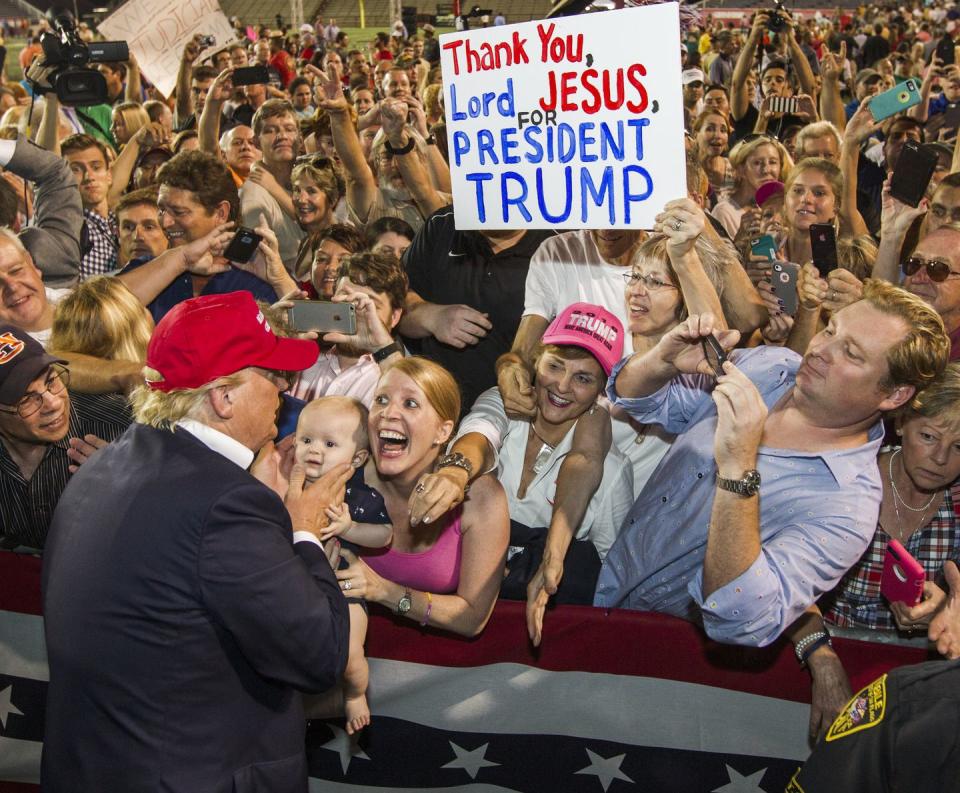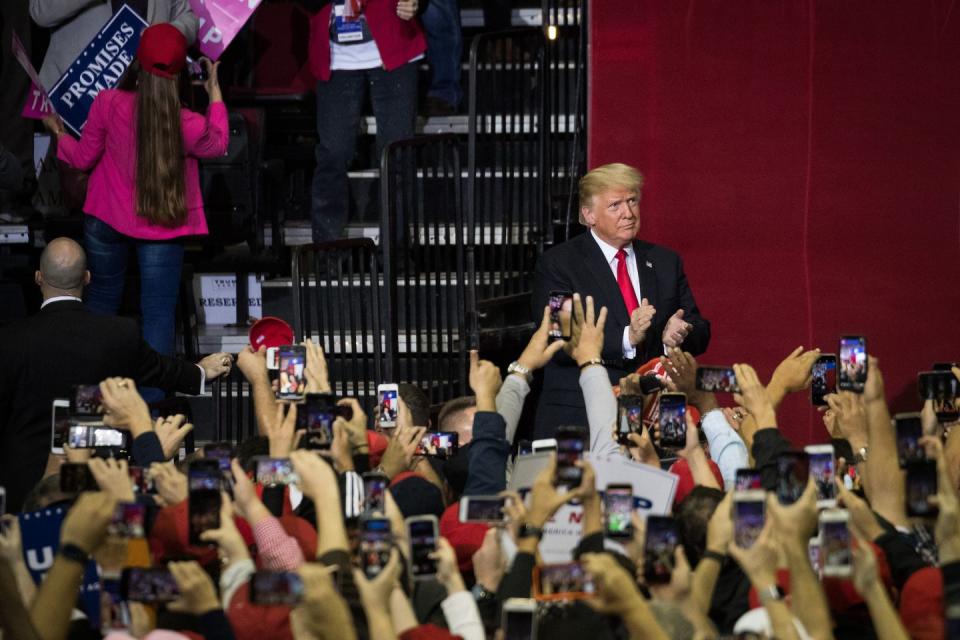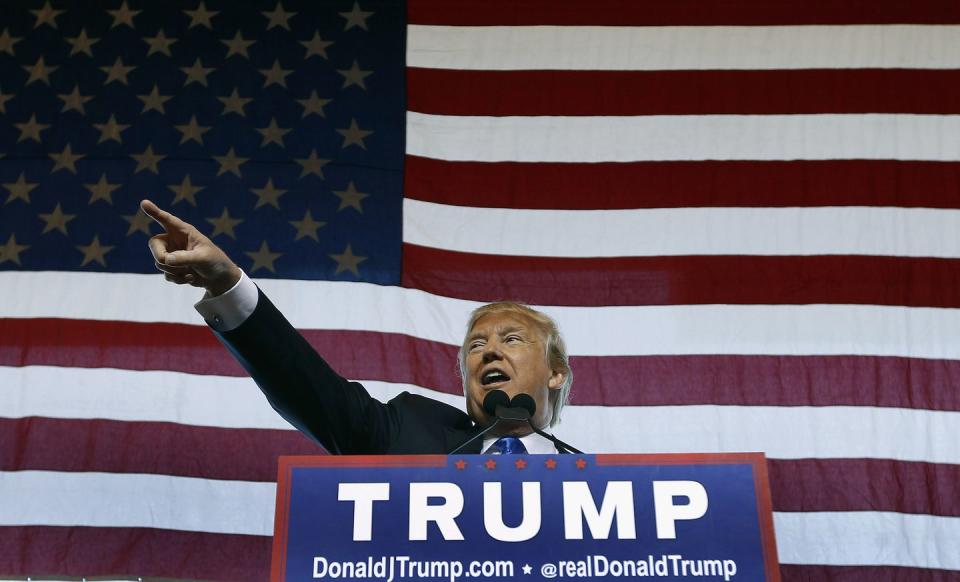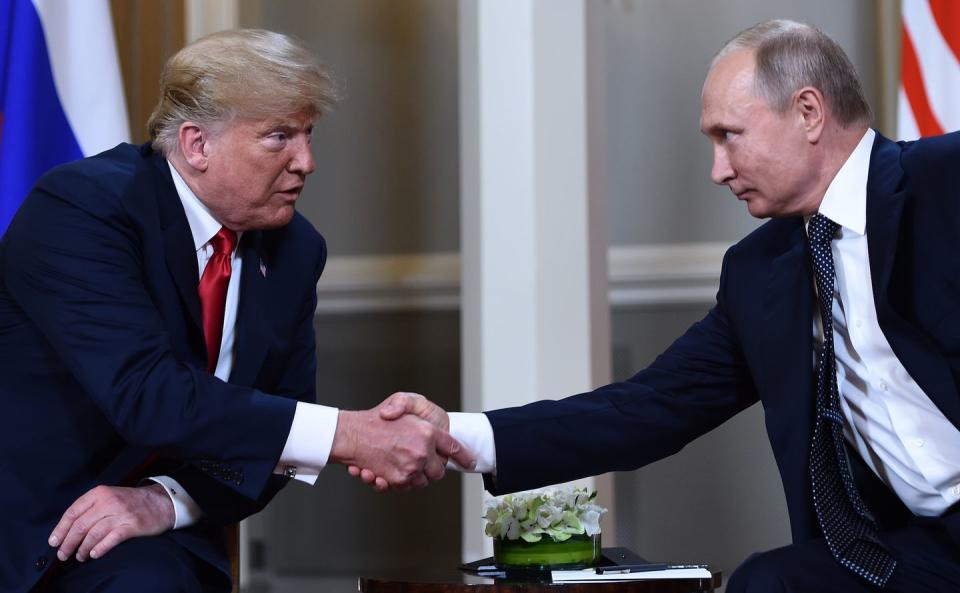President Trump Just Called Himself a 'Nationalist.' Here's What That Means—and Why It's So Dangerous.
Normally, there's a kind of catharsis in watching someone finally admit to themselves and the world who they truly are. Not here. It has never been much of a secret that Donald Trump, American president, is a nationalist. The debate is more often over what adjective might go in front. And yet it was singularly unnerving on Tuesday-in the context of a midterm election campaign in which he and his Republican allies are appealing to racism and anti-immigrant sentiment and fear in a strategy so explicit that The New York Timesfelt comfortable calling it out-to hear him declare, loudly and proudly, that he is "a nationalist, OK?"

The juxtaposition here between "globalist" and "nationalist" is a Steve Bannon joint-a nice hat-tip to the guy on a day where he could be found playing a near-empty conference room on Staten Island. It's the kind of binary nonsense that authoritarian types feed on, an us-or-them formulation where the United States can succeed, or the wider world can succeed, but you can't have both. In the context of a globalized, entirely interconnected world-a development Trump is powerless to reverse-it is fantasy. But it gets the people going.
Now that the President of the United States has embraced it as his own, it's worth digging into what the term "nationalist" actually means and the historical baggage it carries. For this, we can turn once again to George Orwell, the legendary British theorist who, more recently, has become a prop for diaper-wearingright-wing propagandists who looked him up on brainy quote dot com. The essential point, also made eloquently by Charles de Gaulle, is that not only are nationalism and patriotism not the same, the gap between them is not some difference of degree. They are often wholly contrasting emotional forces, as Orwell writes in his Notes on Nationalism:
Nationalism is not to be confused with patriotism...By ‘patriotism’ I mean devotion to a particular place and a particular way of life, which one believes to be the best in the world but has no wish to force on other people. Patriotism is of its nature defensive, both militarily and culturally. Nationalism, on the other hand, is inseparable from the desire for power. The abiding purpose of every nationalist is to secure more power and more prestige, not for himself but for the nation or other unit in which he has chosen to sink his own individuality.
The most infamous examples of runaway nationalism in Orwell's time were Nazi Germany and Imperial Japan. You'll note they were on the other side in World War II, of which we all used to agree the U.S. was on the right side. Again: that's the non-Nazi side, for anyone who went for a stroll in Charlottesville last year. But Orwell also makes clear that nationalism is his term of choice only because he hasn't found one better, and that it can apply to all manner of movements and groups-"Communism, political Catholicism, Zionism, Antisemitism, Trotskyism"-to which people might pledge fealty and surrender themselves.

(Clearly, Donald Trump does not fit the end of that definition above-"not for himself but for the nation." But a nationalist movement only requires that the followers subjugate their own interests to those of the movement. Did the leaders of Germany or Japan make any such sacrifice in the '30s or '40s?)
As Orwell goes on to note, the nationalist leader need not even present a positive vision of the nation or the movement. It can be purely a negation of something else. In the case of Trumpian nationalism, it seems to be White America's attempt at negating a slice of reality itself: that America's demographics are changing, white people are sliding away from majority status, the hold of white men on social and political power is beginning to slip, and historically subjugated groups-including women-are demanding more power for themselves. In yet another study last week, the animating force for Trump supporters was found to be racial resentment. It's not the first, or an outlier.

The response to this development from Trump and his apparatchiks has been to spread fantasies about mass immigration of violent, criminal brown people; to demonize Muslims; to cook up nightmares about an exploding crime rate that's concentrated in cities with large black populations. All these dark forces are contrasted with Real America, the Silent Majority who want to Make It Great Again. During the election, Trump shared disgusting propaganda that radically inflated the prevalence of black-on-white crime. This week, Trump has even combined some of these greatest hits, unleashing the insane lie that there are "unknown Middle Easterners" embedded in a caravan of Central American immigrants and refugees headed for the U.S. southern border.
This rhetoric, we are continually reminded, is effective:
https://t.co/SyU7bietESpic.twitter.com/eUt7O4XcGy
- Kevin Robillard (@Robillard) October 23, 2018
And then, in Orwell's work, things get really eerie:
A nationalist is one who thinks solely, or mainly, in terms of competitive prestige. He may be a positive or a negative nationalist – that is, he may use his mental energy either in boosting or in denigrating – but at any rate his thoughts always turn on victories, defeats, triumphs and humiliations. He sees history, especially contemporary history, as the endless rise and decline of great power units, and every event that happens seems to him a demonstration that his own side is on the up-grade and some hated rival is on the down-grade.
Is there a better summation of Trump's dominance politics than this? Here is the root of his performance: the desire to get a Win, or at least be perceived as The Winner, at all times. The world is sorted into winners and losers, and anything is justified if it allows you to avoid becoming the latter. More to the point, you must continually display your dominance with acts of savage cruelty, stomping on the heads of some marginalized group to show your followers that they are winning, to let the power run coursing through their veins, once again, in a thrilling collective enterprise.

That is what's going on at the rallies when he torments a woman who says she was sexually assaulted as a young girl. That's why the Ralph Steadman figures in attendance have always roared when a protester is removed, however violently. Especially when it's violent. They cheer and jeer when he endorses violence against journalists and political opponents, too. This is why, as my colleague Charles P. Pierce pointed out yesterday, he is now waging war on Americans who identify as transgender. That's why they're throwing children, many of whom are seeking asylum-as is their right under international law and treaties to which the United States is a signatory-in cages.
But the really telling bit is when Orwell tackles the relationship between a nationalist and the truth. Because this is the defining quality of Trumpism. The one factor running through all of it-the racism, the misogyny, the nonsense economic and social policy, the brash and ignorant behavior in foreign affairs-is a fundamental disregard for reality. The president has no interest in facts we can verify about the world, and the process we use to determine them. He is interested only in amassing and spreading information that benefits him and supports his movement.
Nationalism is power hunger tempered by self-deception. Every nationalist is capable of the most flagrant dishonesty, but he is also – since he is conscious of serving something bigger than himself – unshakeably certain of being in the right ...
All nationalists have the power of not seeing resemblances between similar sets of facts. A British Tory will defend self-determination in Europe and oppose it in India with no feeling of inconsistency. Actions are held to be good or bad, not on their own merits, but according to who does them, and there is almost no kind of outrage – torture, the use of hostages, forced labour, mass deportations, imprisonment without trial, forgery, assassination, the bombing of civilians – which does not change its moral colour when it is committed by ‘our’ side.
In nationalist thought there are facts which are both true and untrue, known and unknown. A known fact may be so unbearable that it is habitually pushed aside and not allowed to enter into logical processes, or on the other hand it may enter into every calculation and yet never be admitted as a fact, even in one’s own mind.
There is an unmistakably Trumpian quality to everything here. Inconsistencies and outright contradictions are fixtures of his rhetoric. He bangs on about "due process" and "the presumption of innocence" when his Supreme Court nominee is accused of sexual assault or Saudi allies are accused of murdering and dismembering a U.S.-resident journalist who criticized the regime. But he encourages his crowds to chant "Lock Her Up!" at the very mention of Hillary Clinton's name-and, for that matter, of Dianne Feinstein's. He sees no contradiction. Kavanaugh and the Saudi princes who may or may not be putting money in his pocket are his people. They deserve the protections of the law. Clinton and Feinstein are not just Democrats-enemies-they are powerful women, symbols of that which his movement was built to negate. The law can and should be used against them.
Critically, it is not just Trump who is so willing to disregard the facts. His followers are just as eager, perhaps more so, because they are not seeking information about the world from him, at least as the rest of us might recognize it. They are seeking, in Orwell's words, "the stimulation of nationalistic loyalties."

In Trump's case, though, the flouting of the truth serves a particular purpose: it is always a declaration not of any moral or legal or philosophical principle, but of power. As Masha Gessen once noted in The New York Review of Books, authoritarians in the mold of Trump or Vladimir Putin do not lie or distort to truly convince the listener that what they are saying is true. They seek to demonstrate power over the truth itself, and thus dominate the body politic:
Lying is the message. It’s not just that both Putin and Trump lie, it is that they lie in the same way and for the same purpose: blatantly, to assert power over truth itself. Take, for example, Putin’s statements on Ukraine. In March 2014 he claimed that there were no Russian troops in newly annexed Crimea; a month later he affirmed that Russians troops had been on the ground. Throughout 2014 and 2015, he repeatedly denied that Russian troops were fighting in eastern Ukraine; in 2016 he easily acknowledged that they were there. In each case, Putin insisted on lying in the face of clear and convincing evidence to the contrary, and in each case his subsequent shift to truthful statements were not admissions given under duress: they were proud, even boastful affirmatives made at his convenience. Together, they communicated a single message: Putin’s power lies in being able to say what he wants, when he wants, regardless of the facts. He is president of his country and king of reality.
There is no hypocrisy, no flip-flop, no contradiction, no lies. Only what the leader says. That's how the president and his allies can run on a promise to protect coverage for preexisting conditions while they are suing to gut those protections, or after they voted for various bills to gut them. It doesn't matter.
The Russia investigation is also a perfect illustration of that last phenomenon Orwell points to. The idea that Russia could have tipped the election in his favor-an unproven but not outlandish claim, considering he won thanks to just 80,000 votes spread across three states-is so psychologically "unbearable" that Trump often rejects the premise that Russia intervened at all. Yet there is a growing body of evidence that, at the very least, some of Trump's associates were not just aware of that effort but colluded in it. Trump surely knows this, and makes some of his decisions based on it. Yet he very rarely admits in public that it was Russia that meddled in the election. It's a grimly fascinating psychic bag of worms, dumped out in front of the world.

It also must be said, however, that there's a basic humanity to all of this-a haunting feeling that somewhere in Orwell's sprawling descriptions of mankind's weakness to "delusions and hatreds" we might find something or other that applies to each and every one of us. It is reminiscent of a piece this summer, again in The New York Review of Books, which examined a number of accounts of ordinary German citizens' attitudes towards Hitler's rise. It contained one particularly haunting line, among many:
When Mayer returned home, he was afraid for his own country. He felt “that it was not German Man that I had met, but Man,” and that under the right conditions, he could well have turned out as his German friends did. He learned that Nazism took over Germany not “by subversion from within, but with a whoop and a holler.” Many Germans “wanted it; they got it; and they liked it.”
"It Can Happen Here" was the headline there, a reference to Sinclair Lewis' satire depicting the rise of American fascism. The truth we might all be loathe to grapple with is that we have within us the capacity to get sucked into tribalism and all the barbarity it brings with it. Nationalism is just a supercharged variety. We all have our allegiances. How far will we go to protect them, to justify them?
All that is secondary at the moment, however. It's theoretical. What happened in Houston last night is very practical indeed. The United States president's explicit embrace of nationalism is a stunning world-historical development and a siren blaring on the world stage. The world's most powerful country is now ruled by a man who embraces the racism, chauvinism, cruelty, and utter disregard for the truth that has characterized every great authoritarian regime. He is saying it loud and proud, using the tenets of his worldview in an explicit campaign to scare White Americans into solidifying his grip on power next month.
Does the United States have what it takes to reject this brand of blood-and-soil politics and embrace a vision of America as a nation of ideas? Or are we truly as unexceptional as we have lately made ourselves to be?
('You Might Also Like',)

